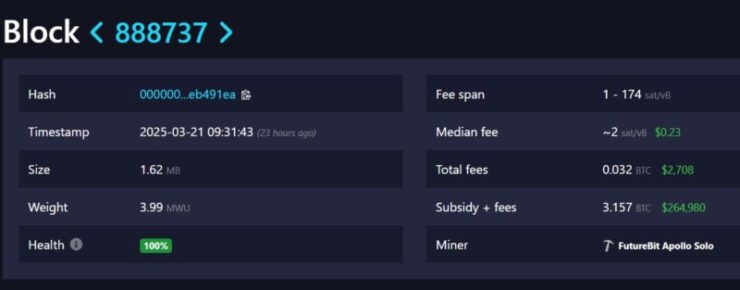A solo Bitcoin miner secured a significant payday on Friday, successfully processing a block without the backing of a major mining pool and earning a reward worth over $266,000. The miner, whose identity remains unknown, solved Bitcoin block number 888,737, which included more than 2,300 transactions.
For the effort, the miner received the standard block subsidy of 3.125 BTC, along with an additional 0.032 BTC in transaction fees. At Bitcoin’s current market price hovering around $84,000 per coin, the total payout amounts to approximately $266,000.
While such solo mining successes are statistically uncommon given the sheer scale of Bitcoin’s network hashrate, it highlights the inherent unpredictability of the Bitcoin protocol—and occasionally, the significant rewards that can follow.
Miner Solves Block With Minimal Hashrate
Bitcoin’s decentralized design allows anyone with the right hardware and technical know-how to participate in securing the network. Miners compete to process blocks containing batches of transaction data, and those who succeed receive both newly minted Bitcoin and the transaction fees tied to that block. Currently, the fixed block reward stands at 3.125 BTC, supplemented by variable fees paid by users.

In recent years, the scale of mining has shifted overwhelmingly toward industrial operations, where large data centers filled with specialized hardware dominate the hashrate. These setups leverage vast energy resources and economies of scale to increase their chances of consistently processing blocks.
However, Friday’s solo miner win stands out as a statistical anomaly. Blockchain records show that the miner used a hobbyist-grade FutureBit Apollo machine—significantly less powerful than the advanced rigs found in commercial mining farms. Despite contributing a fraction of the network’s total computing power, the miner is entitled to the full block reward without having to split profits with a pool.
Solo Mining: More Complex Than It Appears
While stories of individual miners hitting block rewards might seem like tales of lone enthusiasts striking digital gold, industry experts caution that the reality is more nuanced. In blockchain terminology, “solo mining” simply refers to any mining operation not part of a formal mining pool. Unlike pool mining—where participants combine computational power and share both risks and rewards—solo miners retain the full reward but face longer odds of success.
Pseudonymous Bitcoin mining specialist Econoalchemist pointed out in an interview with Decrypt, that the term “solo miner” covers a wide range of setups. It could refer to a single rig running in a hobbyist’s home or a small-scale private warehouse filled with mid-level machines operating independently.
While this week’s winning miner reportedly used a FutureBit Apollo, a device accessible to hobbyists, experts note that many solo operations are far more complex and costly to sustain, especially given Bitcoin’s surging mining difficulty.
Nonetheless, the steady trickle of successful solo block solves in recent months has reignited interest among Bitcoin enthusiasts. As larger corporate mining firms dominate the landscape, some independent operators may see these rare wins as motivation to set up their own rigs—though the long-term profitability remains uncertain in an increasingly competitive market.
Broader Trends: Consolidation and Energy Focus
The Bitcoin mining sector has seen rapid consolidation over the past two years, with large publicly traded mining firms controlling a significant share of the global hash rate. Many of these firms have invested heavily in energy-efficient rigs and have secured long-term power contracts to remain competitive.
Simultaneously, regulatory scrutiny around Bitcoin mining’s environmental impact has intensified, prompting miners to explore renewable energy sources or relocate operations to regions with surplus energy.
This solo miner’s success serves as a reminder of Bitcoin’s decentralized ethos, but the overall trend continues toward industrialization and heightened competition, leaving fewer opportunities for small-scale operators to remain profitable over the long term.
Quick Facts:
- A solo Bitcoin miner processed block #888,737 and earned over $266,000 in total rewards.
- The miner received 3.125 BTC in block subsidy plus 0.032 BTC in transaction fees.
- The miner operated independently, without joining a mining pool.
- Solo mining successes remain rare due to Bitcoin’s increasing network difficulty and industrial-scale competition.





